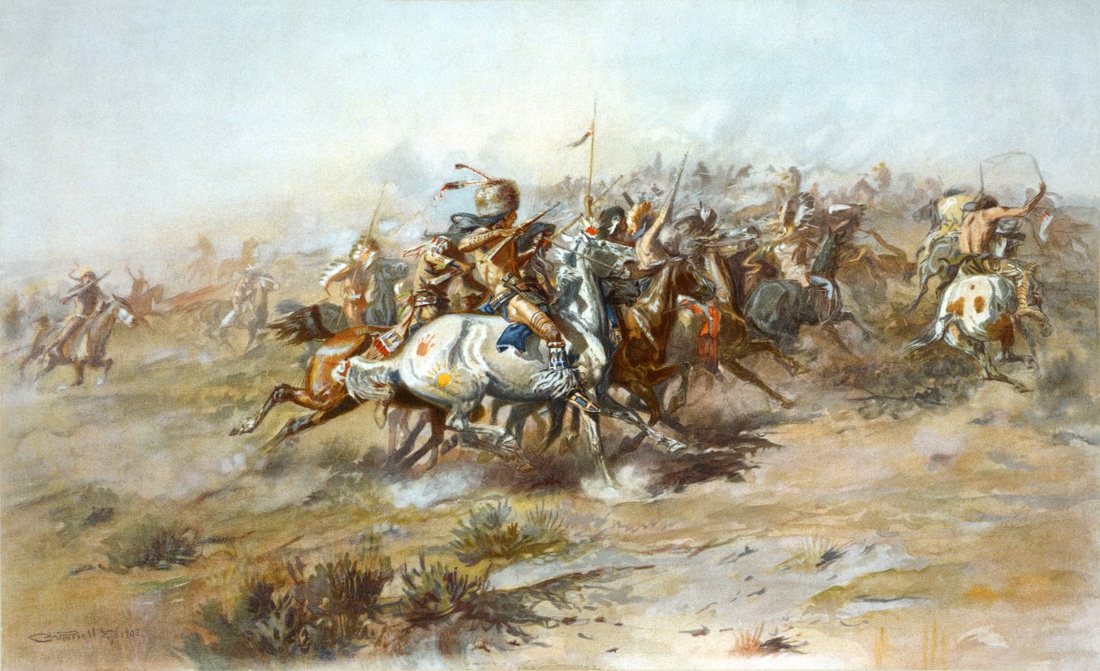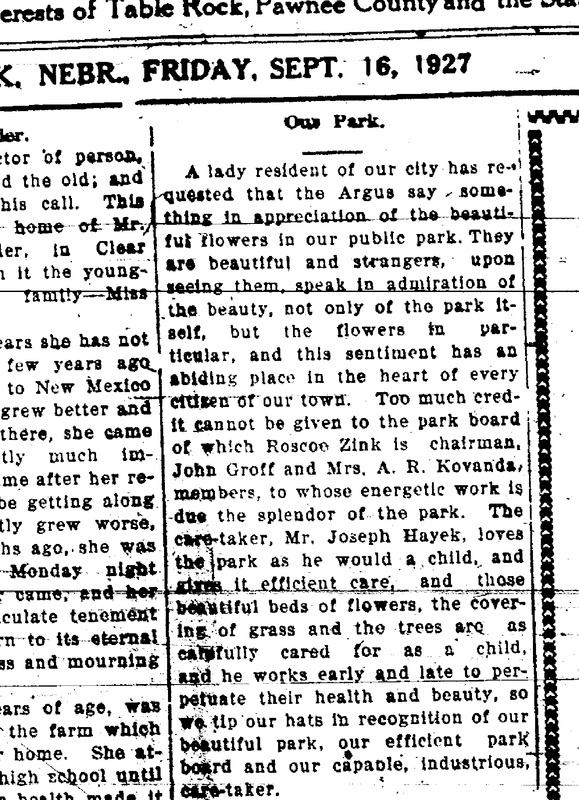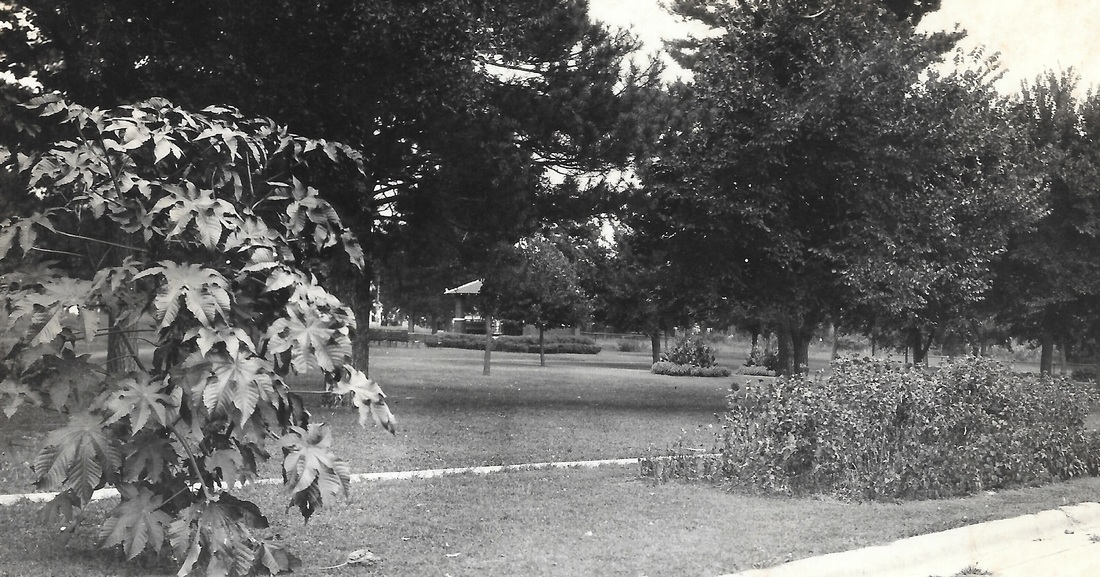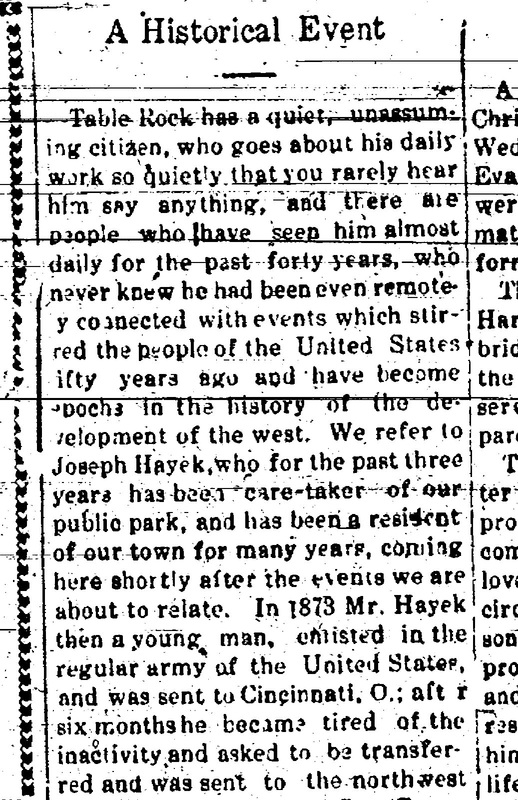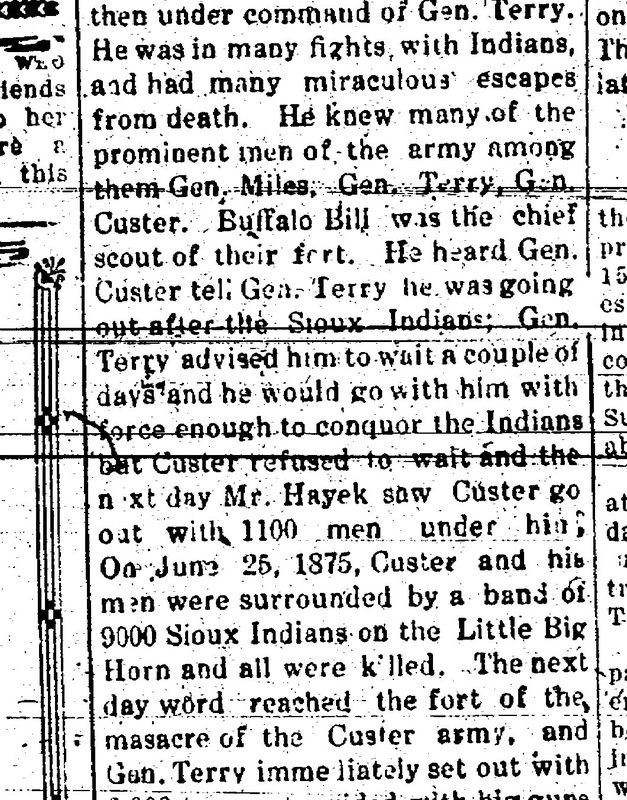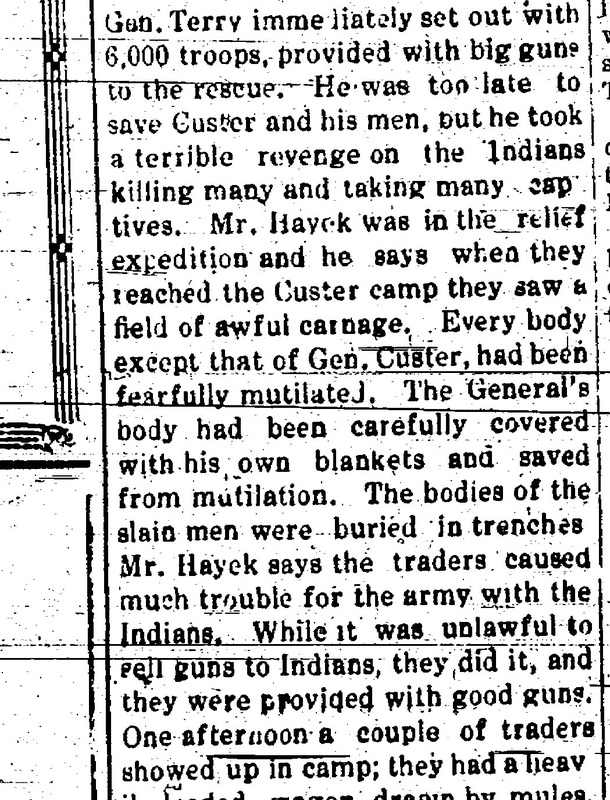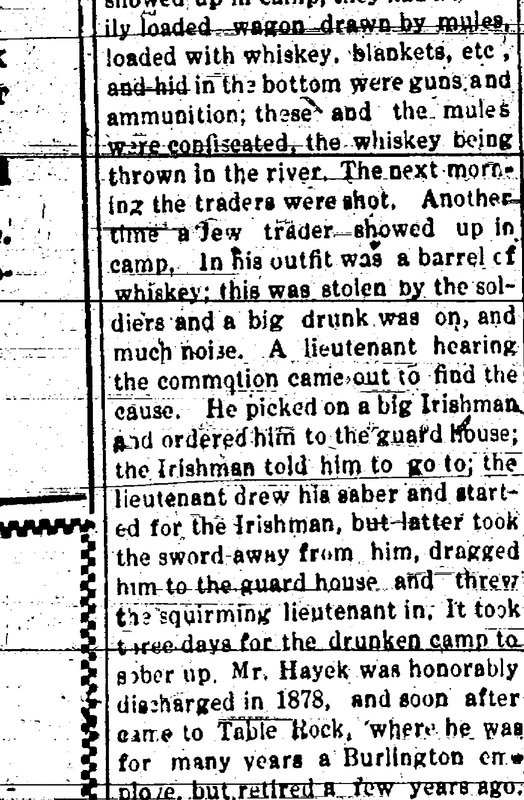he was worth remembering
joseph hayek
introduction - a "quiet, unassuming" old man
Many a person has probably passed by a tombstone in the Czech Cemetery, few if any of them with more than fleeting curiosity. As with other such markers, though, that tombstone marks the resting place of someone who was worth knowing, a man worth remembering.
Joseph Hayek was a kind, unassuming old fellow who was 75 years of age when the people of Table Rock first learned of his history as a veteran of the Indian Wars. Argus editor Frank Taylor published an article about Hayek in 1927:
Joseph Hayek was a kind, unassuming old fellow who was 75 years of age when the people of Table Rock first learned of his history as a veteran of the Indian Wars. Argus editor Frank Taylor published an article about Hayek in 1927:
Table Rock has a quiet unassuming citizen, who goes about his daily work so quietly that you rarely hear him say anything. And there are people who have seen him almost daily for the past forty years, who never knew he had been even remotely connected with events which stirred the people of the United States fifty years ago and have become epochs in the history of the development of the west. We refer to Joseph Hayek.
Joseph F. Hayek's life, as others, may be summarized by dates and places. He was born in Prague (now in the Czech Republic) in 1851.
He probably came to the United States at the age of 16. Ship records on Ancestry.com list only one Joseph Hayek, and he was age 16, born "about" 1851. The port of departure was Bremen, Germany. Arrival was on May 13, 1867.
In 1872, he married Johanna Jakes. They had eight children, at least four of whom were born during the time period 1883 and 187. The same year he was married, or the next year, he enlisted in the Army, in which he remained until 1878. His wife died in 1929. He died in 1931 in Chicago, at the home of his son Fred, at the age of 80; his body was brought to Table Rock and laid to rest next to that of his wife.
In between, he had such a life that he was worth knowing.
He probably came to the United States at the age of 16. Ship records on Ancestry.com list only one Joseph Hayek, and he was age 16, born "about" 1851. The port of departure was Bremen, Germany. Arrival was on May 13, 1867.
In 1872, he married Johanna Jakes. They had eight children, at least four of whom were born during the time period 1883 and 187. The same year he was married, or the next year, he enlisted in the Army, in which he remained until 1878. His wife died in 1929. He died in 1931 in Chicago, at the home of his son Fred, at the age of 80; his body was brought to Table Rock and laid to rest next to that of his wife.
In between, he had such a life that he was worth knowing.
army service in the wild west begins in 1872
In 1872, at the age of 21. Joseph Hayek enlisted in the army
It was said in his obituary that, "He had many exciting experiences during the war with the Indians."
He did. But not at the beginning. He was first sent to Cincinnati, Ohio. After six months he was "tired" of sitting around and asked for a transfer. He was sent west and thus fell under command of General Terry.
While in the west, he knew many of the prominent men of the army, among them General Miles, General Terry, and General Custer. Buffalo bill was the chief scout of the fort.
He was in many fights with Indians and had many miraculous escapes from death.
Mr. Hayeck says the traders caused much trouble for the army with the Indians. While it was unlawful to sell guns to Indians, they did it, and the Indians were provided with good guns.
One afternoon, a couple of traders showed up in camp; they had a heavily loaded wagon drawn by mules loaded with whiskey, blankets etc., and hidden in the bottom were guns and ammunition; these and the mules were confiscated, the whiskey being thrown in the river. The next morning, the traders were shot.
Another time a Jew trader showed up in camp. In his outfit was a barrel of whiskey; this was stolen by the soldiers and a big drunk was on, and much noise. A lieutenant hearing the commotion came out to find the cause. He picked on a big Irishman, and ordered him to the guard house; the Irishman told him to go to _____. The lieutenant dre his saber and started for the Irishman, but the latter took the sword away from him, dragged him the guardhouse, ad threw the squirming lieutenant in. It took three days for the drunken camp to sober up.
It was said in his obituary that, "He had many exciting experiences during the war with the Indians."
He did. But not at the beginning. He was first sent to Cincinnati, Ohio. After six months he was "tired" of sitting around and asked for a transfer. He was sent west and thus fell under command of General Terry.
While in the west, he knew many of the prominent men of the army, among them General Miles, General Terry, and General Custer. Buffalo bill was the chief scout of the fort.
He was in many fights with Indians and had many miraculous escapes from death.
Mr. Hayeck says the traders caused much trouble for the army with the Indians. While it was unlawful to sell guns to Indians, they did it, and the Indians were provided with good guns.
One afternoon, a couple of traders showed up in camp; they had a heavily loaded wagon drawn by mules loaded with whiskey, blankets etc., and hidden in the bottom were guns and ammunition; these and the mules were confiscated, the whiskey being thrown in the river. The next morning, the traders were shot.
Another time a Jew trader showed up in camp. In his outfit was a barrel of whiskey; this was stolen by the soldiers and a big drunk was on, and much noise. A lieutenant hearing the commotion came out to find the cause. He picked on a big Irishman, and ordered him to the guard house; the Irishman told him to go to _____. The lieutenant dre his saber and started for the Irishman, but the latter took the sword away from him, dragged him the guardhouse, ad threw the squirming lieutenant in. It took three days for the drunken camp to sober up.
Joseph Hayek was with Custer's regiment at the time of the fatal massacre. However he had been detailed for some outside camp duty and thus escaped the death inflicted by the Indians on his comrades.
Here is his story as he gave it in 1926, about 50 years after the event as related in 1927. [Note from Sharla: I have not yet been able to confirm him on the military roster of the 7th Cavalry; the only one I've found so far is for the men who were sent out to combat. So we will call it his story, and assume for now that is an accurate memory:
Here is his story as he gave it in 1926, about 50 years after the event as related in 1927. [Note from Sharla: I have not yet been able to confirm him on the military roster of the 7th Cavalry; the only one I've found so far is for the men who were sent out to combat. So we will call it his story, and assume for now that is an accurate memory:
Mr. Hayek was honorably discharged in 1878,
1885 - to table rockIn about 1885, Joseph Hayek came to Table Rock.
He never talked much about his war experience and few of his neighbors in Table Rock knew of his experiences for many years. After coming to Table Rock, he joined the Christian Church. For a long time he was an employee of the Burlington in Table Rock, having in charge the dining car at the stop-over night in Table Rock. Later years he was caretaker for our public park and he loved the park like a child. After Johanna died in 1929, he spent most of his time at his son Fred's in Chicago, where he was when he died. His remains were brought to Table Rock for burial in the Bohemian Cemetery east of town. The body arrived in Table Rock on a train from Chicago, accompanied by his son, Fred, and his wife, and was taken to the home of his daughter, Mrs. Earl Irwin. His funeral was held at the Christian Church on November 1, 1931. The American Legion honored him as an "old soldier." The members "acted as military escort to the church and cemetery where they took charge and carried out their ritualistic service which was very impressive, and many a tear was shed as the body was lowered into its last resting place." In his obituary in the Argus, it was said: "Mr. Hayek was a good father, a good citizen and a faithful friend, and during his many years of life in Table Rock he won many friends." He won many friends, and many a tear was shed as the remains of this 80-year-old man were consigned to the earth. His five years in the Indian Wars were surely the answer to his complaint that his service in Cincinnati was not exciting enough. He apparently lived a quiet life in the many years after he left the service, I suppose that was enough. He was a steady man who retired to care for our beautiful park as though it were a child. He was a faithful friend, an unassuming man. He was a man worth remembering. |
commentaryAccording to the National Park
Service, Custer left from Fort Abraham in the Dakota Territory, near where Bismark, North Dakota now stands. He left on May 17, 1876, and the battle occurred 40 days later. The battle near the Little Bighorn River in the eastern part of Montana Territory was between the combined forces of the Lakota, the Northern Cheyenne, and Arapahoe tribes and the Army's 7th Cavalry Regiment. According to one source, the Sioux Expedition was a "complicated plan that involved the coordination of three separate commands departing from three separate locations and intended to converge at approximately the same time." Those commands were led by General Terry, General Custer, and Major General Gibbon. "Terry's intent was to trap the Indians between Custer and Major General Gibbon in the Little Big Horn Valley...Terry's plan was to force a fight on 26 June in the valley of the Little Bighorn River." Although Custer may have had many more with him when he left Fort Abraham, when he marked for the Little Bighorn, he marched with approximately 700 soldiers; that was on June 22. The Indians were led by several major war leaders, including Crazy Horse and Chief Gall, inspired by the visions of Sitting Bull. It was the most prominent action of the Big Sioux War. A couple of facts had faded over the 50 years since the event. Mr. Hayek had his own memory to rely on. In the information age, a quick look on the computer reveals a few facts in the big picture that were off. The battle occurred in 1876 rather than 1875 Custer's force numbered 700 men rather than 1100; 210 were at the battle scene and were killed; others had been detached and were five miles away. |
in praise of the park, a 1927 argus article:
Joseph Hayek cared for the park as he would a child, working early and late to perpetuate the health and beauty of the trees and grass and flowers. Strangers speak in admiration of the beauty of the flowers in particular, a sentiment held in the heart of every citizen of Table Rock:
the park in the square circa 1926 - in his old age, joseph hayak cared for it tenderly, as if his own child. (photo 591)
details of photo 591:
source information
1926 article
his obituary
TABLE ROCK ARGUS, Nov. 6, 1931.
OBITUARY-
The funeral of Joseph F. Hayek was held in the Christian Church on Sunday, November 1, at 11 o'clock, conducted by the pastor, Rev. C. S. Alvord. Mr. Hayek was an old soldier, having served five years in the regular army in the Indian wars, and was given a military funeral by the American Legion who acted as military escort to the church and cemetery where they took charge and carried out their ritualistic service which was very impressive, and many a tear was shed as the body was lowered into its last resting place.
Joseph F. Hayek was born in Prague, Bohemia, July 12, 1851, and passed away at the home of his son, Fred Hayek, in Chicago, October 29, 1931, aged 80 years, 3 months and 17 days. He was united in marriage to Johanna Jakes January 2, 1872, and to this union eight children were born: Mrs. Barbara Cottwell of Chicago; Mrs. Martha Gatzmeyer of Webber, Kansas; Will Hayek, McCook; Mrs. Clint Caselton, Table Rock; Fred Hayek, Chicago; Mrs. Earl Irwin, Table Rock; Joseph Hayek and Edward have gone on before.
At the age of 21 years Mr. Hayek enlisted in the army and served five years in the Indian wars.
In 1885 he came to Nebraska where he resided until the death of his wife January 10, 1929, after which he spent most of his time with his son in Chicago.
Mr. Hayek was a good father, a good citizen and a faithful friend, and during his many years of life in Table Rock he won many friends. He had many exciting experiences during the war with the Indians and was with Custer at the time of the fatal massacre, but had been detailed for some outside camp duty and thus escaped the death inflicted by the Indians on his comrades. The next day he was one of these detailed to return to the camp to gather up the bodies of the dead. He never talked much about his war experience and few of his neighbors in Table Rock knew of his experiences for many years. For a long time he was an employee of the Burlington in Table Rock, having in charge the dining car at the stop-over night in Table Rock. Later years he was caretaker for our public park and he loved the park like a child. The body arrived in Table Rock from Chicago on Saturdayafternoon, accompanied by his son, Fred, and his wife, and was taken to the home of his daughter, Mrs. Earl Irwin.
